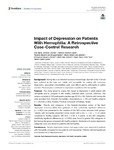Mostrar o rexistro simple do ítem
Impact of Depression on Patients With Hemophilia: A Retrospective Case-Control Research
| dc.contributor.author | López-López, Daniel | |
| dc.contributor.author | Jiménez-Cebrián, Ana María | |
| dc.contributor.author | Palomo-López, Patricia | |
| dc.contributor.author | Becerro-de-Bengoa-Vallejo, Ricardo | |
| dc.contributor.author | Losa Iglesias, Marta Elena | |
| dc.contributor.author | Navarro Flores, Emmanuel | |
| dc.contributor.author | San Antolín, Marta | |
| dc.contributor.author | Calvo-Lobo, César | |
| dc.date.accessioned | 2022-09-22T09:24:51Z | |
| dc.date.available | 2022-09-22T09:24:51Z | |
| dc.date.issued | 2022-07 | |
| dc.identifier.citation | Jiménez-Cebrián AM, Palomo-López P, Becerro-de-Bengoa Vallejo R, Losa-Iglesias ME, Navarro-Flores E, San-Antolín M, Calvo-Lobo C, López-López D. Impact of Depression on Patients With Hemophilia: A Retrospective Case-Control Research. Front Psychiatry. 2022 Jul 4;13:892321. doi: 10.3389/fpsyt.2022.892321. PMID: 35859603; PMCID: PMC9289383. | es_ES |
| dc.identifier.uri | http://hdl.handle.net/2183/31707 | |
| dc.description.abstract | [Abstract] Background: Hemophilia is an inherited recessive hemorrhagic disorder of the X-linked type, suffered by the male sex. Adults with hemophilia are coping with numerous diagnostics, associated comorbidities, pain, and difficult gait by arthropathy in ankles and feet. Physical pains contribute to depression in patients with hemophilia. Purpose: The study aimed to assess the impact of depression in adult patient with hemophilia and to compare it with healthy matched-paired controls. Methods: The sample consisted of 100 participants (median age 42.50 ± 30). Patients with hemophilia were recruited from Spanish Hemophiliac Associations (n = 50) and healthy subjects (n = 50) from a Clinic Podiatry Practices (University of Malaga, Spain). Results: Results and categories of the Spanish-translated version of the Beck Depression Inventory (BDI) were gathered. A clear statistically significant difference (p < 0.001) was presented in the variation of the BDI scores between both groups. Patients with hemophilia presented worse results with a BDI = 7.50 ± 11.25 points compared to healthy subjects with BDI = 2.50 ± 5 points. In the BDI categories, statistically significant differences (p = 0.004) were found in greater BDI categories in the Hemophilia group compared with healthy subjects. Moderate and severe depression categories were only shown in patients with hemophilia. Conclusions: Greater depression scores and range status were observed in patients with hemophilia compared to non-patients with hemophilia. Patients with hemophilia are at increased risk of depressiveness. | es_ES |
| dc.language.iso | eng | es_ES |
| dc.publisher | Frontiers | es_ES |
| dc.relation.uri | doi: 10.3389/fpsyt.2022.892321 | es_ES |
| dc.rights | Atribución 3.0 España | es_ES |
| dc.rights.uri | http://creativecommons.org/licenses/by/3.0/es/ | * |
| dc.subject | Beck depression inventory | es_ES |
| dc.subject | Depression | es_ES |
| dc.subject | Foot health | es_ES |
| dc.subject | Hemophilia | es_ES |
| dc.subject | Healthy | es_ES |
| dc.subject | Inventario de depresión de Beck | es_ES |
| dc.subject | Depresión | es_ES |
| dc.subject | Salud podológica | es_ES |
| dc.subject | Saúde podolóxica | es_ES |
| dc.subject | Hemofilia | es_ES |
| dc.subject | Saludable | es_ES |
| dc.subject | Saudable | es_ES |
| dc.title | Impact of Depression on Patients With Hemophilia: A Retrospective Case-Control Research | es_ES |
| dc.type | info:eu-repo/semantics/article | es_ES |
| dc.rights.access | info:eu-repo/semantics/openAccess | es_ES |
| UDC.journalTitle | Frontiers in Psychiatry | es_ES |
| UDC.volume | 13 | es_ES |
| UDC.startPage | 892321 | es_ES |
Ficheiros no ítem
Este ítem aparece na(s) seguinte(s) colección(s)
-
GI-UDISAP - Artigos [196]






